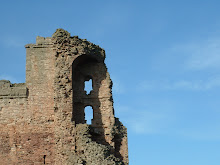So, today's post is going to be just a little ranting and raving about classes in tabletop RPGs.
Classes are, and have been, a major system and method for implementing character advancement and differentiation in RPGs. Starting with Chainmail and early D&D, classes defined different character roles, abilities, and archetypes. I've been reading a bunch of the Old School D&D blogs recently, while also casting back into my library of late 70's/early 80's tabletop games, and thinking about what classes mean, and how they have changed.
In some modern systems (D&D 4E is a good example) the distinctions between the functionality of classes has all but disappeared, leaving class to define the flavor of you character - not WHAT he can do, but more generally HOW he does it, whether with magic, faith, etc. This has certainly led to a leading criticism of 4E, which is that all of the classes are basically the same. However 4E also includes the concepts of character roles, generally imported from MMORPGs and more tactically oriented table games, which means these modern classes may primarily function as skins for similar abilities, but each class has been placed into one of four broader baskets which define WHAT the character chooses to do and is best at - what role he plays in the group when in combat, and to a lesser extent, in roleplay and adventuring.
This topic is rife in the OSDD blogs at the moment, with a lot of great discussion about what a class can and should be, and different ways of looking at classes and how to define them. Check out particularly - The Nine and Thirty Kingdoms, which has an ongoing discussion of class archetypes and examines them in literature and tries to define simple broad characteristics. This partially is to serve the old school commandements of simplicity and restricted character power (encouraging players to creatively use a limited set of abilities or powers rather than to amass a list of powers which are fired off one by one).
I am not, necessarily, an old school only kind of a guy, and actually like some of the power-gaming and more detailed character creation that has come from modern tabletop games. But I think the impulse to define a classes capabilities in a short, clear way is a strong assist to roleplayers at the table, and I think the impulse to have a class cover the role or the what a character does in the game in good.
I'm, therefore, currently playing with the idea of using classes to match to play styles - starting with a very simple set of classes taht resemblt the basic 4, and letting each one's abilities be defined by how the player likes to engage in the game - are they interested in overwhelming enemies with pure physical might, or do they prefer tactical battles where they take advantage of unfair situations. Is the player focused on acquiring magical power and using knowledge to advance in the game, or would they rather harness creative inspiration and risk taking?
Some of this work is going into a project I'm working on at the moment, but I'm interested in what people think about the following four 'core' classes:
Warrior - Attains power through skill of arms, primarily uses equipment to fight monters and navigate the world around them. Defining factor is ability to study many different styles of fighting / use many different kinds of equipment and use the appropriate one for the situation.
Mage - Attains power through study, primarily uses magic to fight monsters and navigate the world around them. Defining factor is great flexibility with magic and the ability to touch deep magical reserves restricted from other characters.
Rogue - Attains power through practice, primarily uses skill and manipulation to fight monsters and navigate the world around them. Defining factor is the large resolution bonuses such characters gain when they can catch an opponent at a disadvantage, or create a disadvantage for an opponent.
Champion - Attains power through devotion to an ideal, primarily uses inspired actions and specially granted magical powers to fight monsters and navigate the world around them. Defining factor is the ability to pull of small miracles and stretch the use of their abilities into any situation that their devotion drives them to.
I know thats all a little vague, but you can see the kernels of the classics inside these archtypes, and hopefully how these classes are a little broader while still defining a clear role for the player at the table. These classes would be paired with another defining characteristic to form a complete character, who has both a role in the world, and a history and place to come from.
Subscribe to:
Posts (Atom)
